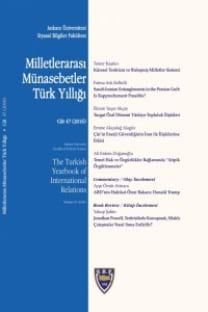International Legal Satus Of The Caspian Sea; Issues Of Theory And Practice
International Legal Satus Of The Caspian Sea; Issues Of Theory And Practice
Since the collapse of the USSR, long established stability of compromise around the Caspian has left its place to competition and confrontation. While the USSR and Iran were the only coastal states in the Caspian basin during the Cold War, five states came to share the control över the Caspian Sea in the Post-Soviet period, and they were quick to declare their rights to the particular parts of the Sea in a unilateral manner, which led to controversies. Consequently, since 1992, there is a search for allegations, stimuli and causes for the formation of the multilateral relations regarding the status and usage of the Caspian Sea. However, altered geopolitical situation has made the issue of multinational ovvnership of the Caspian Sea and its delimitation, a matter of urgency. Ali the post-Soviet Caspian states, except Russia, declared at once their non-recognition of the legal force of the SovietIranian contractual base 1921-1940 pertaining to the Caspian Sea. What follovved vvas a contentious discussion on the legal status of the Caspian and its utilization. International negotiations on the Caspian problems, especially on determination of its international legal status, can be divided into three stages; First stage, vvhich may be defined as the period of investigation, acquaintance and search after reasonable solutions, covers 1991-1994. Second stage covers 1995-1999, during vvhich nevv ideas and postures vvere generated, range of serious multilateral meetings and conferences, discussing the national postures tovvard the Caspian Sea and other issues, vvere held. The tlıird, and the last stage goes back to January 2000, i.e. to the moment vvhen the nevv leader of Russia, Vladimir Putin, rise to the povver. His arrival precipitated development of a nevv approach by the Russian Federation regarding the Caspian region and its problems.
Keywords:
International Lavv, Caspian Basin, Energy Resources, Legal Status International Negotiations.,
- ISSN: 0544-1943
- Yayın Aralığı: Yıllık
- Başlangıç: 1960
- Yayıncı: Ankara Üniversitesi Siyasal Bilgiler Fakültesi Uluslararası İlişkiler Bölümü
Sayıdaki Diğer Makaleler
The Iraqi Questİons In The International Context And Its Domestic Reflections
Gökhan BACIK, Havva KARAKAŞ KELEŞ
An Analysis Of The Qestern Scholarly Discourse On Turkic Identity In Central Asia
Turkish-Bulgarian Relations In The Post-Cold War Era; The Exemplary Relationship In The Balkans
Geopolitics Of Central Asia And The Cauasus; Continuity An Change Sinca The End Of The Cold War
International Legal Satus Of The Caspian Sea; Issues Of Theory And Practice
A Comparative Study Of Employment Services In Great Britain And Turkey
The Commonwealth Of Independent States; Decayed Within A Decade
